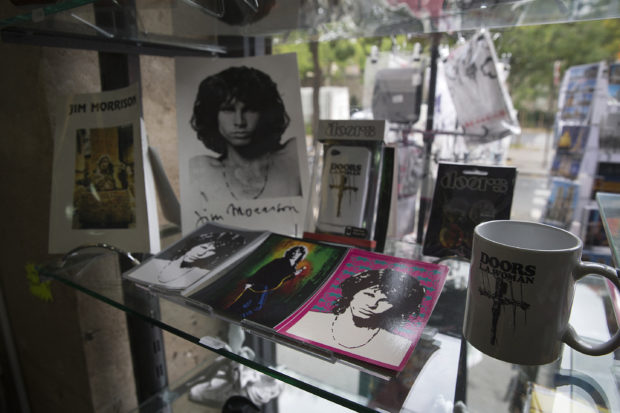
Items depicting late US singer Jim Morrison displayed in a souvenirs shop in the Pere-Lachaise cemetery in Paris. Image: AFP/Joel Saget
He occupies a small, tucked-away corner of a Paris cemetery, but many thousands still seek it out: half a century since his death, Jim Morrison remains a fabled presence in the City of Light.
The death of The Doors’ frontman on July 3, 1971 was one of the key signs that the optimism of the 1960s was coming to a grim end.
Today, the Lizard King lies in the Pere-Lachaise cemetery at the eastern end of the city.
Even with Google Maps, it can be tricky to find, a deliberate decision of the family who rightly feared a deluge of fans.
“It’s a cemetery that he particularly loved. He often came walking here,” says rock critic and Doors aficionado Sophie Rosemont.
“He would have wanted to be buried next to Oscar Wilde,” she said, referring to the other famous tenant of the cemetery, but the spot would have been too prominent.
The grave’s seclusion has not prevented millions from paying their respects over the decades, the photo of another rock legend, Patti Smith, posing here is itself iconic.
Its headstone is protected by barriers that will no doubt be under threat again this week.
‘Didn’t die here’
Morrison’s last home was an apartment on the third floor of 17 rue Beautreillis in the bohemian district of the Marais.
It was owned by model Elizabeth “Zozo” Lariviere, and Morrison moved there with his girlfriend Pamela Courson, hoping to escape the madness of his fame in the United States and dedicate himself to writing.
He would survive just three months in Paris.
The official version is that he died in his bath tub of cardiac arrest, aged 27.
But on the facade of his old building, someone has left a note: “Jim Morrison didn’t die here,” a sign that another story has long been making the rounds.
Journalist Sam Bernett has investigated the case over the years, and argues that the rock legend overdosed in the toilets of a nightclub, the Rock’n’Roll Circus, that he helped run.
“His face was grey, his eyes closed, there was blood under his nose and a white foam around his slightly open mouth and in his beard, he was not breathing,” Bernett writes in “The End: Jim Morrison.”
Singer and sixties icon Marianne Faithfull backed that story in an interview with Mojo magazine, saying the fatal dose came from dealer-to-the-stars Jean de Breteuil, whom she was dating at the time.
‘Friends of Jim’
The club at 57 rue de Seine, long gone, “was a fairly crazy place,” says Rosemont.
“It was frequented by intellectuals, hippies, little thugs, big thugs, bourgeois folks, stars like Mick Jagger….”
As she is speaking at the site to AFP, an American introduces himself.
Pete has been coming here regularly since 1991 around the anniversary of Morrison’s death, holding meetings with other “friends of Jim in cafes around Pere-Lachaise.”
Other stops on the pilgrimage might include Place des Vosges and the book kiosks that line the Seine where Morrison liked to wander, trying to stay as anonymous as possible.
And also the famous English-language bookshop Shakespeare and Company.
“It’s a place that Morrison very quickly became attached to. He didn’t speak very good French, even if he loved Rimbaud, Beaudelaire, Mallarme a lot,” says Rosemont.
This brought him regularly into the Left Bank, near the home of his friend, the film-maker Agnes Varda, and Cafe La Palette where he liked to drink, and where a few glasses will no doubt be raised to his name on Saturday. JB
RELATED STORIES:
Marianne Faithfull turns to poetry as COVID-19 robs her of song
Bob Dylan announces first streaming special ‘Shadow Kingdom’ for July

